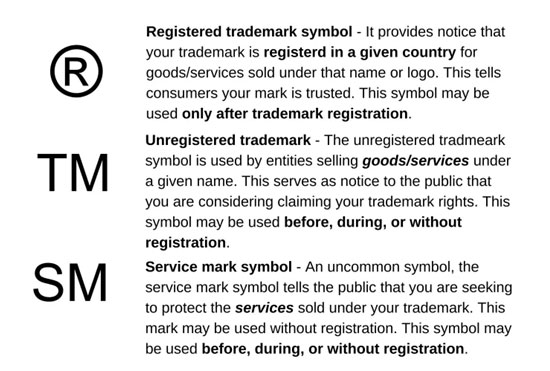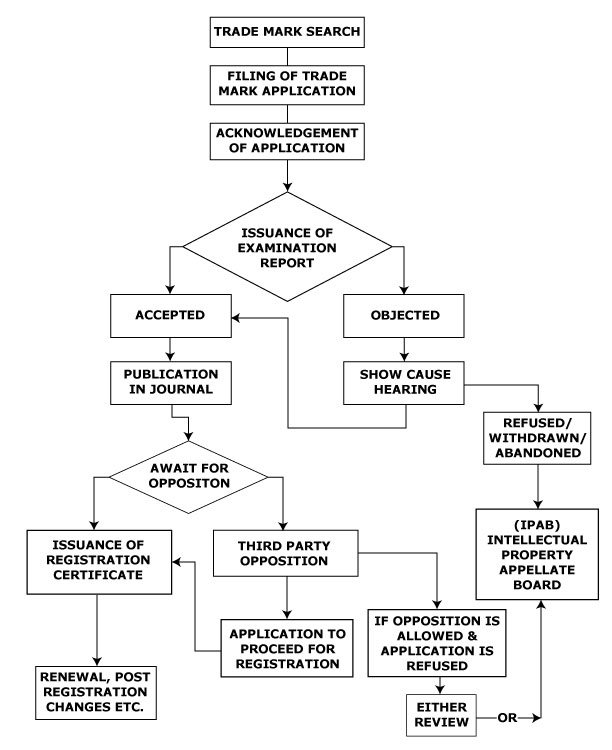Trademark Overview
We at VGC can help you to get your Trademark registered.
Trademark Registration plays a vital role in enhancing the business image and goodwill. Besides, this registration ensures the unique positioning of goods and services, thereby enabling businesses to reap more profit. In general, Trademark registration serves as a legit instrument that provides comprehensive fencing of the company's intangible assets such as brand name and logo against possible infringement.
Getting Trademark registration is a tedious affair considering the quantum of compliances presented in the prevailing Act. Presently, it is governed by the Trademark Act, 1999, which lays down various provisions relating to registration, eligibility criteria, and type of rights accessible to the owner.
There are 45 trademark classes and all the goods and services are categorized across these classes. You need to be very careful while picking the classes as it will determine the validity of your trademark registration for your business’ products/services. If your business operates across different goods/services that fall under different classes, you have to ensure that you can apply for a trademark online under all the applicable classes.
Types of trademarks that can be registered in India
A trademark refers to a brand or a logo that distinguish one's product from others. Trademark is the legal term for "intellectual property".
Trademark can be a word, name, logo, tagline, symbol, image or a combo of these elements. A trademark identifies the brand owner of a specific product or service.
Trademark Symbols

Documents
Documents required for Trademark Application
Note that original papers are not required to be submitted as part of the trademark application procedure. The criterion could be met by scanning a copy of the original document. Thus, it become important to categorize the applicant first. Applicant can be categorized as:
Thus, it become important to categorize the applicant first. Applicant can be categorized as:
- Individual
- Sole proprietor
- Partnership firm
- LLP
- Company
INDIVIDUAL OR SOLE PROPRIETOR - In India, any individual, whether an Indian or a foreign national, can readily register a trademark. The formation of a legal body or a corporate entity is not required to register a trademark. Furthermore, the paperwork required to register a trademark in a proprietorship's name are the same as those required to register a trademark in an individual's name, as follows:
- PAN Card of individual or sole proprietor
- AADHAR Card of individual or sole proprietor
- Trademark description - description of goods or services
- Form - 48 (POA)
- Mobile no.
- Email id
- Date of use
- GST (if any)
- LOGO (if any) except in case of registering of word mark, mention the logo if any logo is there,
PARTNERSHIP FIRM
- Documents required for registering trademark on behalf of partnership firm are:
- KYC of all the partners such as PAN Card, Aadhar card etc.
- GST (if any)- if the partnership firm has taken GST in its Name , it must be used.
- LOGO (if any)- except in case of registering of word mark, mention the logo if any logo is there,
- Trademark description- description of goods or services
- Form -48 (POA)
- Mobile no.
- Email id
- Date of use
- MSME (if any)
- Partnership deed
COMPANY
- Documents required for registering trademark on behalf of company are -
- KYC Of partners - of all the partners such as PAN Card, Aadhar card etc.
- GST (if any) if the Company has taken GST in its Name, it must be used.
- LOGO (if any)- except in case of registering of word mark, mention the logo if any logo is there,
- Trademark description- description of goods or services
- Form-48 (POA)
- Mobile no.
- Email id
- Date of use
- MSME (if any)
- COI-certificate of incorporation
Procedures
Procedure and process for trademark application

1. Trademark Search = The trademark owner will get to know whether they have any existing competition in the same trade or not, since, all the existing trademarks are available with the Trademark Registry. Conducting a search gives a warning that whether the owner will have any risk of using that trademark or is it safe. One other option that you have is to use the unique name with the generic name.
2. Filing an Application = the application must be filed in Form TM-A either online from the IP India's official website. Once the application is filed with the department an application number gets generated. The applicant can continuously track the status of his application through that number. The owner of the trademark is empowered to affix the TM symbol after obtaining the allotment number.
3. Examination Process = Once the application is filed, it will be thoroughly examined by the Registrar and they will prepare an examination in writing and will send a copy of it to the applicant with 30 days to let them know whether the Registry wants to refuse or conditionally accept the application and shall also include the materials by which he came to such a decision. Now a days it generally take 7-8 months for examination report.
4. Post Examination Procedures = After the hearing process, if the examiner is fully satisfied, can accept the mark and forward it for publication in the Trademark Journal or can refuse the application if any objection is still there.
5. Publication of the Trademark Application = After the examiner has accepted the application, it will be published in the Trademark Journal which will remain there for 4 months. Advertisement of such an application is done so that within the time period stated above, any third party can see it and if they want can file an opposition against the applicant.
6. Notice of Opposition = Within four months of the first date of appearance, any person may file a notice of opposition to a trademark that appears in the trademark journal. It must be filed on Trademark Form 5 in the prescribed format and with the applicable fees.
7. Registration = The last step is to get the certificate of registration. In case where there is no opposition or any false opposition filed, after 4 months of publication period is over, within 7 days an auto- generated registration certificate will be issued to the applicant by the trademark registry office which needs to be renewed after every 10 years for keeping it alive.
Characteristics
Benefits and Characteristics of Trademark registration
- Provide much-needed thrust to a brand value which could further be translated into increased sales for the company.
- Facilitate exclusive ownership right to the owner, i.e. ensuring complete fencing of concerned IP asset.
- Enable companies to reduce marketing campaign budget for promoting particular goods and services.
- Create IP assets for the company that can be sold, assigned, franchised or commercially contracted.
- Vest owners with rights to sue the infringer in case of trademark infringement.
For any further query on our Trademark services please contact us on info@vgccs.in